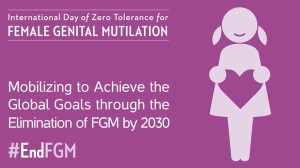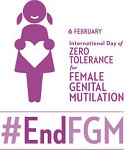February 6 is International Day of Zero Tolerance for Female Genital Mutilation (FGM), a day to raise awareness of the practice and work towards its elimination.
The elimination of FGM is a key target under Goal 5 of the UN’s Sustainable Development Goals, and this year’s day is being held under the theme “Mobilizing to Achieve the Global Goals through the Elimination of FGM by 2030.”
FGM comprises all procedures that involve altering or injuring the female genitalia for non-medical reasons and is recognised internationally as a violation of the human rights of girls and women. Globally, it is estimated that between 100 million to 140 million girls and women alive today have undergone some form of FGM, and, if current trends continue, 15 million additional girls between ages 15 and 19 will be subjected to it by 2030.
FGM is mostly carried out on young girls sometime between infancy and age 15, and the procedure can result in severe bleeding and health issues including cysts, infections and infertility, as well as complications in childbirth that increase risk of newborn deaths.
UNFPA and UNICEF jointly lead the largest global programme to accelerate the abandonment of female genital mutilation, which you can learn more about here.
